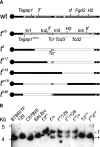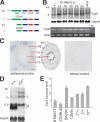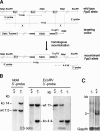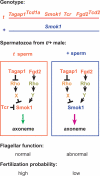The t-complex-encoded guanine nucleotide exchange factor Fgd2 reveals that two opposing signaling pathways promote transmission ratio distortion in the mouse
- PMID: 17234881
- PMCID: PMC1770897
- DOI: 10.1101/gad.414807
The t-complex-encoded guanine nucleotide exchange factor Fgd2 reveals that two opposing signaling pathways promote transmission ratio distortion in the mouse
Abstract
Transmission ratio distortion (TRD), the preferential inheritance of the t haplotype from t/+ males, is caused by the cooperative effect of four t-complex distorters (Tcd1-4) and the single t-complex responder (Tcr) on sperm motility. Here we show that Fgd2, encoding a Rho guanine nucleotide exchange factor, maps to the Tcd2 region. The t allele of Fgd2 is overexpressed in testis compared with wild type. A loss-of-function allele of Fgd2 generated by gene targeting reduces the transmission ratio of the t haplotype t(h49), directly demonstrating the role of Fgd2 as Distorter. Fgd2 identifies a second Rho G protein signaling pathway promoting TRD.
Figures




Similar articles
-
Two isoforms of the RAC-specific guanine nucleotide exchange factor TIAM2 act oppositely on transmission ratio distortion by the mouse t-haplotype.PLoS Genet. 2019 Feb 28;15(2):e1007964. doi: 10.1371/journal.pgen.1007964. eCollection 2019 Feb. PLoS Genet. 2019. PMID: 30817801 Free PMC article.
-
The t complex-encoded GTPase-activating protein Tagap1 acts as a transmission ratio distorter in mice.Nat Genet. 2005 Sep;37(9):969-73. doi: 10.1038/ng1617. Epub 2005 Aug 14. Nat Genet. 2005. PMID: 16116428
-
Genes in the first and fourth inversions of the mouse t complex synergistically mediate sperm capacitation and interactions with the oocyte.Dev Biol. 2000 Oct 15;226(2):267-80. doi: 10.1006/dbio.2000.9870. Dev Biol. 2000. PMID: 11023686
-
Transmission ratio distortion in mice.Annu Rev Genet. 2003;37:393-408. doi: 10.1146/annurev.genet.37.110801.143030. Annu Rev Genet. 2003. PMID: 14616067 Review.
-
[Transmission ratio disruption, sterility, and control of t-complex function in sperm].Genetika. 2001 Sep;37(9):1198-206. Genetika. 2001. PMID: 11642122 Review. Russian.
Cited by
-
Mate choice for genetic compatibility in the house mouse.Ecol Evol. 2013 May;3(5):1231-47. doi: 10.1002/ece3.534. Epub 2013 Mar 20. Ecol Evol. 2013. PMID: 23762510 Free PMC article.
-
Transmission ratio distortion: review of concept and implications for genetic association studies.Hum Genet. 2013 Mar;132(3):245-63. doi: 10.1007/s00439-012-1257-0. Epub 2012 Dec 15. Hum Genet. 2013. PMID: 23242375 Review.
-
Assessment of transmission distortion on chromosome 6p in healthy individuals using tagSNPs.Eur J Hum Genet. 2009 Sep;17(9):1182-9. doi: 10.1038/ejhg.2009.16. Epub 2009 Mar 4. Eur J Hum Genet. 2009. PMID: 19259136 Free PMC article.
-
Controlling invasive rodents via synthetic gene drive and the role of polyandry.Proc Biol Sci. 2019 Aug 28;286(1909):20190852. doi: 10.1098/rspb.2019.0852. Epub 2019 Aug 21. Proc Biol Sci. 2019. PMID: 31431159 Free PMC article.
-
Fine Mapping of Two Interacting Loci for Transmission Ratio Distortion in Rice (Oryza sativa L.).Front Plant Sci. 2022 Mar 29;13:866276. doi: 10.3389/fpls.2022.866276. eCollection 2022. Front Plant Sci. 2022. PMID: 35422832 Free PMC article.
References
-
- Bauer H., Willert J., Koschorz B., Herrmann B.G., Willert J., Koschorz B., Herrmann B.G., Koschorz B., Herrmann B.G., Herrmann B.G. The t complex-encoded GTPase-activating protein Tagap1 acts as a transmission ratio distorter in mice. Nat. Genet. 2005;37:969–973. - PubMed
-
- Brent A.E., Schweitzer R., Tabin C.J., Schweitzer R., Tabin C.J., Tabin C.J. A somitic compartment of tendon progenitors. Cell. 2003;113:235–248. - PubMed
-
- Eddy E.M., Toshimori K., O’Brien D.A., Toshimori K., O’Brien D.A., O’Brien D.A. Fibrous sheath of mammalian spermatozoa. Microsc. Res. Tech. 2003;61:103–115. - PubMed
-
- Herrmann B.G., Koschorz B., Wertz K., McLaughlin K.J., Kispert A., Koschorz B., Wertz K., McLaughlin K.J., Kispert A., Wertz K., McLaughlin K.J., Kispert A., McLaughlin K.J., Kispert A., Kispert A. A protein kinase encoded by the t complex responder gene causes non-Mendelian inheritance. Nature. 1999;402:141–146. - PubMed
Publication types
MeSH terms
Substances
LinkOut - more resources
Full Text Sources
Other Literature Sources
Molecular Biology Databases
